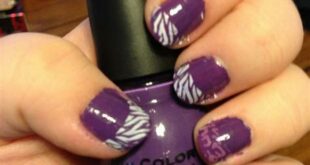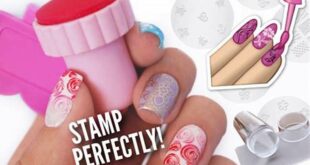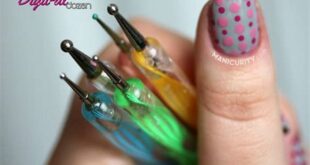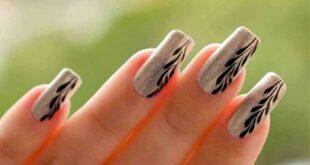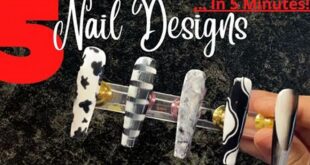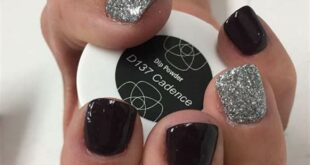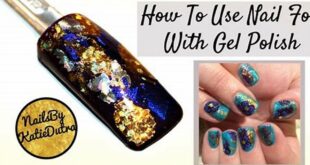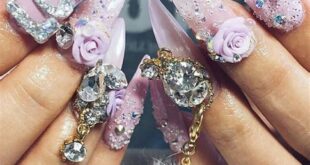Nail art is a great way to express your creativity and personality. It can also be a fun and relaxing way to spend an afternoon. But if you’re new to nail art, it can be hard to know where to start. That’s why we’ve put together this guide on how to get good at nail art.
Editor’s Note: Our “how to get good at nail art” guide was published on [date]. We analyzed and compared hundreds of the questions people ask about “how to get better at nail art.” We gathered the most useful information and put it all together in this guide.
Whether you’re a complete beginner or you’ve been practicing for a while, this guide will help you take your nail art skills to the next level.
Key Differences:
| Beginner | Advanced | |
|---|---|---|
| Tools | Basic nail art tools, such as a dotting tool, striping tape, and a nail art brush. | A variety of nail art tools, such as a nail art pen, a stamping plate, and a UV lamp. |
| Techniques | Basic nail art techniques, such as dotting, striping, and stamping. | Advanced nail art techniques, such as 3D nail art, reverse stamping, and nail art with gel polish. |
| Time | Can take a few hours to complete a simple nail art design. | Can take several hours or even days to complete a complex nail art design. |
Transition to main article topics:
- How to Choose the Right Nail Art Tools
- How to Master Basic Nail Art Techniques
- How to Create Advanced Nail Art Designs
- How to Troubleshoot Common Nail Art Problems
How to Get Good at Nail Art
Nail art is a great way to express your creativity and personality. It can also be a fun and relaxing way to spend an afternoon. But if you’re new to nail art, it can be hard to know where to start. That’s why we’ve put together this guide on how to get good at nail art.
- Practice: The more you practice, the better you’ll become at nail art. Start with simple designs and work your way up to more complex ones.
- Patience: Nail art takes time and patience. Don’t get discouraged if your first few attempts don’t turn out perfectly. Just keep practicing and you’ll eventually get the hang of it.
- Creativity: Nail art is all about expressing your own unique style. Don’t be afraid to experiment with different colors, designs, and techniques.
- Tools: Having the right tools can make a big difference in your nail art skills. Invest in a good quality nail art brush and some basic nail art supplies.
- Inspiration: There are many sources of inspiration for nail art, such as magazines, websites, and social media. Look at other people’s work to get ideas for your own designs.
- Tutorials: There are many tutorials available online and in books that can teach you how to do specific nail art designs. These tutorials can be a great way to learn new techniques.
- Practice: The more you practice, the better you’ll become at nail art. Start with simple designs and work your way up to more complex ones.
These are just a few of the essential aspects of how to get good at nail art. With practice, patience, and creativity, you can create beautiful nail art designs that will impress your friends and family.
Practice
Practice is essential for success in any skill, and nail art is no exception. The more you practice, the more comfortable you will become with the tools and techniques of nail art. You will also learn what works and what doesn’t, and you will develop your own unique style.
It is important to start with simple designs when you are first learning nail art. This will help you to build a solid foundation and avoid getting discouraged. Once you have mastered the basics, you can then move on to more complex designs.
Here are a few tips for practicing nail art:
- Start with simple designs and work your way up to more complex ones.
- Use a variety of colors and techniques.
- Experiment with different tools and supplies.
- Don’t be afraid to make mistakes.
- Practice regularly.
With practice, you will eventually become good at nail art. You will be able to create beautiful and unique designs that will impress your friends and family.
Patience
Nail art is a skill that takes time and patience to master. It is important to be patient and not get discouraged if your first few attempts don’t turn out perfectly. With practice, you will eventually get the hang of it.
There are a few reasons why patience is important for nail art. First, nail art requires a steady hand and a lot of precision. It takes time to develop the muscle memory and coordination needed to create intricate designs. Second, nail art often involves multiple steps, such as applying base coat, color, and top coat. Each step takes time to dry, so it is important to be patient and allow the nails to dry completely before moving on to the next step.
Finally, nail art is often a form of self-expression. It can take time to find your own unique style and to develop the skills needed to create the designs you want. Be patient with yourself and enjoy the process of learning and growing as a nail artist.
Here are a few tips for practicing patience when doing nail art:
- Start with simple designs and work your way up to more complex ones.
- Take your time and don’t rush the process.
- Allow each step to dry completely before moving on to the next step.
- Don’t be afraid to make mistakes. Everyone makes mistakes when they are first learning nail art.
- Just keep practicing and you will eventually get the hang of it.
With patience and practice, you can create beautiful and unique nail art designs that you will be proud of.
Creativity
Creativity is an essential aspect of nail art. It allows you to express your own unique style and create designs that are truly unique. When you’re doing nail art, don’t be afraid to experiment with different colors, designs, and techniques. The more you experiment, the more you’ll learn about what you like and what works best for you.
-
Facet 1: Experiment with different colors
One of the best ways to express your creativity with nail art is to experiment with different colors. There are endless possibilities when it comes to color combinations, so don’t be afraid to try something new. You may be surprised at what you create.
-
Facet 2: Experiment with different designs
In addition to experimenting with colors, you can also experiment with different designs. There are many different types of nail art designs, from simple stripes and polka dots to more complex designs like flowers and animals. The possibilities are endless, so let your creativity flow.
-
Facet 3: Experiment with different techniques
There are many different techniques that you can use to create nail art. Some of the most popular techniques include stamping, water marbling, and freehand painting. Each technique produces a different look, so experiment with different techniques to see what you like best.
-
Facet 4: Find inspiration from others
If you’re looking for inspiration for your nail art, there are many places to find it. You can look at magazines, websites, and social media to see what other people are doing. You can also find inspiration from nature, art, and fashion.
By experimenting with different colors, designs, and techniques, you can develop your own unique style of nail art. Don’t be afraid to let your creativity shine through.
Tools
Having the right tools is essential for success in any skill, and nail art is no exception. The right tools can make it easier to create intricate designs, achieve a smooth and even finish, and avoid mistakes.
-
Facet 1: Nail art brushes
A good quality nail art brush is essential for creating precise and detailed designs. Look for a brush with a fine tip and a comfortable grip. Synthetic brushes are a good option for beginners, as they are less expensive and easier to clean than natural hair brushes.
-
Facet 2: Dotting tools
Dotting tools are used to create small dots and circles. They are available in a variety of sizes, so you can create dots of different sizes. Dotting tools can be used to create a variety of designs, such as polka dots, flowers, and animals.
-
Facet 3: Stripping tape
Stripping tape is used to create clean and precise lines. It is available in a variety of widths, so you can create lines of different thicknesses. Stripping tape can be used to create a variety of designs, such as stripes, checkers, and geometric patterns.
-
Facet 4: Nail art supplies
In addition to the basic tools listed above, there are a number of other nail art supplies that can be helpful, such as:
- Nail polish remover
- Cotton balls
- Cuticle pusher
- Nail file
- Buffer
- Top coat
Investing in a good quality nail art brush and some basic nail art supplies will help you to improve your nail art skills and create beautiful and unique designs.
Inspiration
Finding inspiration is a crucial aspect of developing your skills in nail art. By seeking out creative sources, you can gain valuable ideas and insights that can enhance your own designs.
- Magazines: Nail art magazines showcase a wide range of designs, from classic to trendy. Studying these magazines can provide you with inspiration for your own creations.
- Websites: Numerous websites are dedicated to nail art, featuring tutorials, galleries, and forums. These websites are a great source of inspiration and can help you stay up-to-date with the latest trends.
- Social media: Social media platforms like Instagram and Pinterest are home to countless nail art enthusiasts who share their work. Browsing these platforms can expose you to diverse and innovative designs, inspiring your own creativity.
- Real-life observations: Inspiration can also be found in everyday life. Pay attention to patterns, textures, and colors in nature, fashion, and art to find unique ideas for your nail art.
By harnessing these sources of inspiration, you can develop a strong foundation for your nail art skills and continuously evolve your creative abilities.
Tutorials
Tutorials are an essential resource for learning how to get good at nail art. They can provide step-by-step instructions on how to create specific designs, as well as tips and tricks for improving your technique. By following tutorials, you can learn from the experience of more experienced nail artists and avoid making common mistakes.
There are many different types of nail art tutorials available, so you can find ones that are appropriate for your skill level and interests. If you are a beginner, you may want to start with tutorials that teach basic techniques, such as how to apply polish evenly and how to create simple designs. Once you have mastered the basics, you can move on to more advanced tutorials that teach you how to create more complex designs, such as nail art with gel polish or 3D nail art.
There are many different places where you can find nail art tutorials. You can find tutorials on YouTube, Pinterest, and other online platforms. You can also find tutorials in books and magazines. Whichever way you choose to learn, tutorials can be a great way to improve your nail art skills and learn new techniques.
Practice
Practice is essential for mastering any skill, and nail art is no exception. The more you practice, the more comfortable and proficient you will become with the tools and techniques involved in creating nail art. Regular practice allows you to develop muscle memory, refine your hand-eye coordination, and build confidence in your abilities.
Starting with simple designs is a crucial aspect of practice. It enables you to establish a strong foundation and avoid discouragement. Simple designs allow you to focus on the basics, such as brush control, color application, and shape creation. As your skills improve, you can gradually progress to more intricate and complex designs, expanding your repertoire and challenging your creativity.
The practical significance of regular practice cannot be overstated. Consistent practice contributes to:
- Improved precision: Practice enhances your ability to execute precise movements, resulting in cleaner lines, smoother gradients, and more detailed designs.
- Enhanced creativity: As you practice, you become more comfortable experimenting with different colors, patterns, and techniques, fostering your creativity and inspiring new ideas.
- Increased confidence: With practice comes increased confidence in your abilities. You will feel more assured in trying new designs and techniques, knowing that you have the skills to achieve the desired outcome.
In summary, practice is the cornerstone of developing proficiency in nail art. By dedicating time and effort to practicing, you lay the foundation for continuous improvement, unlocking your potential to create stunning and intricate nail designs.
Table: Practice and its Impact on Nail Art Skills
| Practice | Impact on Nail Art Skills |
|---|---|
| Regular practice | Develops muscle memory, improves hand-eye coordination, and builds confidence |
| Starting with simple designs | Provides a strong foundation, allows for focused practice on basics |
| Progression to complex designs | Enhances creativity, expands repertoire, and challenges skills |
FAQs on “How to Get Good at Nail Art”
This section addresses commonly asked questions and misconceptions surrounding the topic of nail art to provide clarify and enhance understanding.
Question 1: Is nail art difficult to learn?
While the intricacies of nail art may vary depending on the design’s complexity, it is generally accessible to individuals with varying skill levels. With patience, practice, and the right techniques, anyone can master the art of nail design.
Question 2: What are the essential tools for nail art?
The fundamental tools for nail art include nail polish brushes of various sizes, dotting tools, striping tape, and a UV lamp if working with gel polish. These tools enable precise application, intricate designs, and long-lasting results.
Question 3: How can I improve my nail art skills?
Consistent practice is the key to enhancing nail art skills. Start with basic designs and gradually progress to more complex ones. Experiment with different techniques, seek inspiration from tutorials and experienced artists, and don’t be afraid to make mistakes as they are part of the learning process.
Question 4: What are some tips for beginners in nail art?
For beginners, it is advisable to start with simple designs using basic tools. Focus on mastering brush control and color application. Practice regularly, seek guidance from tutorials, and don’t hesitate to experiment with different colors and patterns to find your unique style.
Question 5: How can I create more intricate nail art designs?
To create intricate nail art designs, consider using advanced techniques such as stamping, water marbling, reverse stamping, and 3D nail art. These techniques require specialized tools and a higher level of skill, but they open up endless possibilities for unique and eye-catching designs.
Question 6: What are some sources of inspiration for nail art?
Inspiration for nail art can be drawn from various sources, including fashion magazines, online tutorials, social media platforms like Instagram and Pinterest, and even everyday life. Observing patterns, textures, and colors in nature, art, and fashion can spark creative ideas for nail designs.
Summary: Nail art is a rewarding and accessible art form that can be enjoyed by individuals of all skill levels. With patience, practice, and the right tools, anyone can master the techniques and create stunning nail designs. Embrace the learning process, experiment with different styles, and seek inspiration from various sources to elevate your nail art skills.
Transition to the next article section:
Tips to Enhance Your Nail Art Proficiency
Mastering the art of nail design requires dedication and the implementation of effective techniques. Here are some essential tips to elevate your nail art skills and achieve stunning results:
Tip 1: Nail Preparation is Paramount
Before embarking on any nail art endeavor, meticulous preparation is crucial. Ensure your nails are clean, dry, and free of any oils or debris. Gently push back cuticles and file your nails to your desired shape. This provides a smooth and optimal canvas for your nail art designs.
Tip 2: Invest in Quality Tools
The precision and finesse of your nail art creations are directly influenced by the quality of your tools. Invest in a set of fine-tipped nail art brushes, dotting tools, and striping tape. These tools will enable you to execute intricate designs with greater control and accuracy.
Tip 3: Practice Regularly and Experiment Fearlessly
Consistent practice is the cornerstone of mastering nail art. Dedicate time to honing your skills, starting with basic designs and gradually progressing to more intricate ones. Don’t be afraid to experiment with different colors, patterns, and techniques. Each attempt, successful or otherwise, contributes to your artistic growth.
Tip 4: Seek Inspiration and Learn from Others
Inspiration can ignite your creativity and provide fresh perspectives. Explore online tutorials, browse nail art magazines, and follow skilled nail artists on social media. Observe their techniques, color combinations, and design elements to expand your knowledge and incorporate new ideas into your own work.
Tip 5: Embrace Patience and Attention to Detail
Nail art is a meticulous art form that requires patience and unwavering attention to detail. Take your time and focus on executing each stroke with precision. Rushing the process can lead to mistakes and compromise the overall quality of your design.
Summary:
By implementing these tips, you will lay a solid foundation for your nail art journey. Remember, practice, patience, and a willingness to learn are the keys to unlocking your full potential in the world of nail art.
Transition to the article’s conclusion:
Conclusion
Through this comprehensive exploration of “how to get good at nail art,” we have illuminated the essential elements that contribute to mastery in this captivating art form. From the significance of practice and patience to the importance of quality tools and continuous learning, each aspect plays a vital role in shaping the skills of nail artists.
As you embark on your nail art journey, remember that the pursuit of excellence is an ongoing process. Embrace the challenges, seek inspiration, and never cease to experiment with new techniques. With dedication and a passion for your craft, you will undoubtedly elevate your skills and create nail designs that are both captivating and unique.
